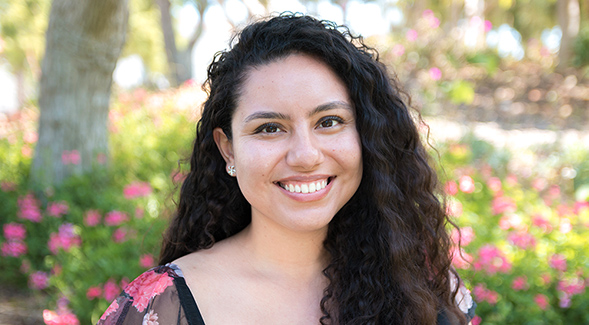Empowerment and Reflection: A Conversation with Elzbeth Islas
Elzbeth Islas, director of the Womens Resource Center, hopes students can find a space of learning, care, and community through the center.

Elzbeth Islas knows the value of a tight-knit community on a university campus. As an undergraduate at the University of California San Diego, Islas was involved in several community centers on campus.
“It was through these transformative spaces that I found empowerment, reflection, and radical self-acceptance,” said Islas, now the director of the Women’s Resource Center (WRC) at San Diego State University. “From then on, it became my life mission to create and sustain these kinds of spaces for future students. My hope is that this work will not only enrich students’ experiences at the university, but also build movements for a more loving and just world.”
Holding a master's degree in postsecondary educational leadership with a specialization in student affairs from SDSU, Islas began working at the WRC in 2017. Under Islas’s leadership, the center has continued to develop innovative programming to serve students of various backgrounds and circumstances.
Other signature programs of the WRC include the Black Women’s Healing Circle, a gathering space for Black feminine centered individuals held in collaboration with the Black Resource Center, and the Queer Femme Community Circle, a safe space to connect and discuss the lived experiences of queerness and being femme-presenting, held in collaboration with SDSU’s Pride Center.
The SDSU News Team spoke to Islas about what inspires her and the importance of a connected community on campus.
As director of the Women's Resource Center, what inspires you to do this important work day in and day out?
The students I serve, the women in my support system, and feminist thinkers like Audre Lorde and Gloria Lucas inspire and motivate me. Working with students at the Women’s Resource Center revitalizes me; their brilliance, heart, and tenacity recenter me and remind me why I do what I do. From welcoming students to the WRC for the first time, to witnessing WRC student leaders’ ideas come to life, it has been a tremendous gift working and growing with students over the past four years.
I am also constantly inspired by the women in my family and the women who mentored me as both a student and as a career staff. I am a firm believer in lifting as we climb, and I would not be where I am now without the people who believed in me.
SDSU places high importance on the values of diversity, equity and inclusion. Why are these values important to you as a person and educator?
Equity, diversity, and inclusion are values that are important and personal to me. Having Mexican immigrant parents and not knowing how to speak English when I first moved to the U.S. has helped me intimately understand the need to level the playing field, and reject “colorblind” ideologies which assume we all have the same access to resources.
When I was a college student, my Ethnic Studies major at UCSD gave me a loving and empowering space of belonging within the university. Spaces like the Ethnic Studies Department and centers like the WRC create communities to share our experiences, find validation and support, and understand how marginality, privilege, and systems of oppression play a role in what we face.
The Women's Resource Center connects students, faculty, and staff on so many levels—academically, socially and politically. Why is building a connected community important on campus?
There are many campus organizations, students, faculty, and staff dedicated to social justice. We are so much stronger together. Our inaugural Women’s History Month celebration has been successful because of the support and dedication of folks across SDSU. Meaningfully collaborating with campus and community partners not only strengthens the WRC’s intersectional feminist lens; it makes coalition building possible. When we come together it signals to students, all of whom are multi-faceted and have different salient identities, that they can bring their whole selves. Gender and identity are so varied, and through our programming and collaborations we want to honor those differences. Lastly, a connected campus community allows us to support each other during times of tragedy, and to celebrate our joy, resilience, and humanity.
The Women's Resource Center is well-known for its diverse and consistent programming. What can students hope to learn and achieve through the Women's Resource Center programming?
My hope is that students can find a space of learning, care, and community when they attend any WRC program. The majority of our programming is led by WRC student leaders who infuse their passions and knowledge, and who fiercely care about creating spaces that are accessible, empowering, and validating.



